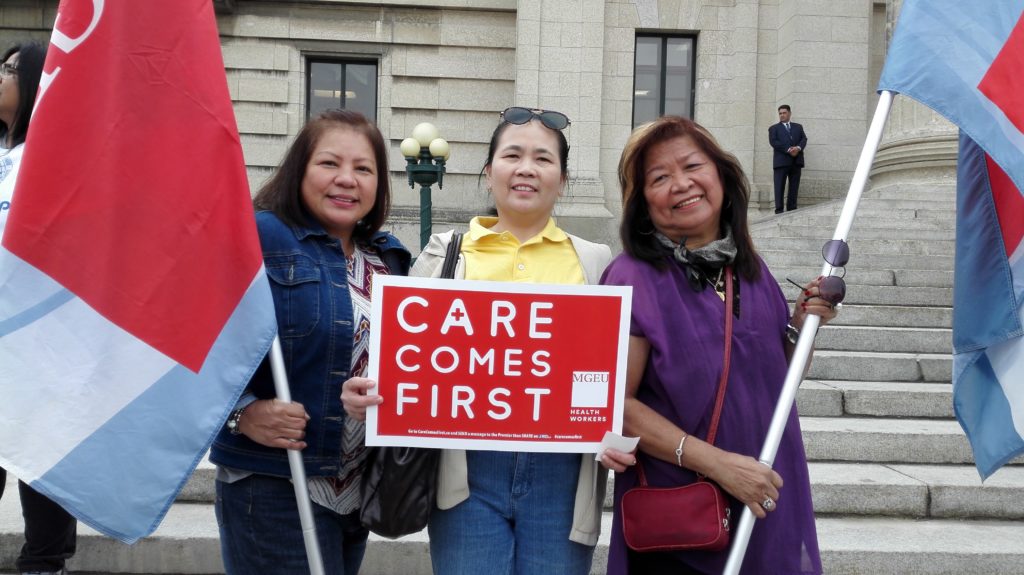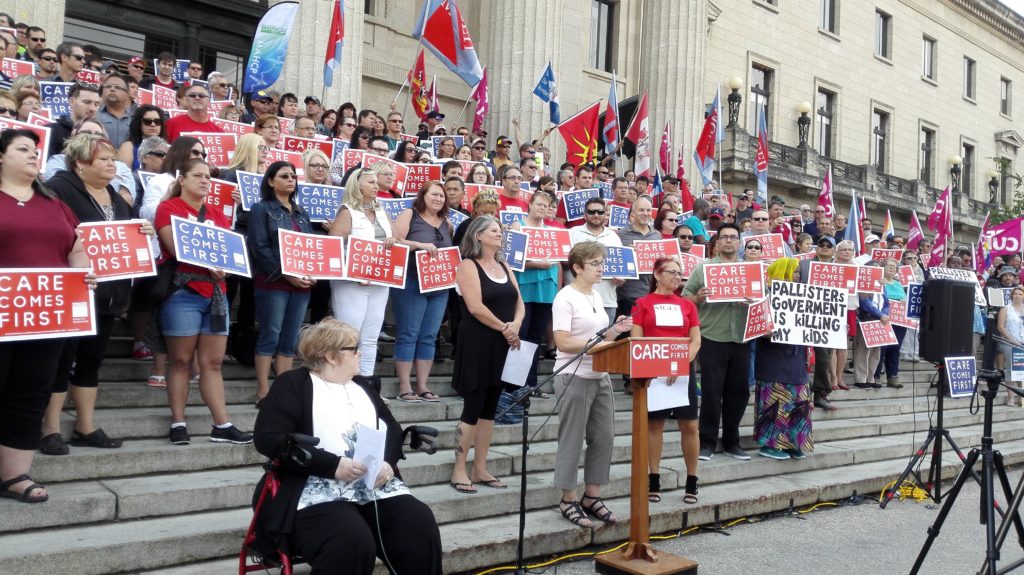Fil-Canadians join protest against Winnipeg health care cuts

Filipino health care professionals Luz Yadao Ortilla,Mercy Galvez Puznak and Medine Rosario at their union rally. INQUIRER/Isabel Buenaobra
WINNIPEG, Manitoba — Filipino Canadian health care workers have joined the protest against the health care revamp being implemented by the provincial government.
Manitoba Premier Brian Pallister government has ordered the Winnipeg Regional Health Authority (WHRA) to find $83 million in savings in its $2.6 billion budget, including cuts to about 15 percent of its management. To reduce its budget, WRHA will be closing half of Winnipeg’s emergency departments.
Union president Michelle Gawronsky charged that “Premier Brian Pallister campaigned on a promise to protect public services.” But now his government “is turning its back on Manitoba families with reckless cuts to our health care and talk of privatization,” she said during a recent “Care Comes First” protest by the Manitoba Government and General Employees’ Union (MGEU) in front the legislative building.
Review ordered
The previous NDP government had ordered a review of the Manitoba health care situation; the resulting report calls for the reorganization of service delivery on a massive scale.
According to a WHRA fact sheet, reducing emergency services (from six to three) would concentrate specialists and diagnostic services in fewer facilities, resulting in “better access and shorter wait times.” Emergency services would be concentrated in three hospitals: Grace Hospital; St. Boniface Hospital; and the Health Sciences Centre.
The revamp, however, would mean changes in the roles of nurses and nurse practitioners; longer travel time for patients with the closure of emergency departments in their communities; retraining or upgrading of skills of health care professionals who have never provided emergency services previously; and loss of jobs.

Manitoba Government and General Employees’ Union (MGEU) on September 13 protested the health revamp in front of the Manitoba Legislative Building. INQUIRER/Isabel Buenaobra
In October, the Victoria General Hospital emergency room will close; the Seven Oaks and Concordia Hospital’s emergency rooms will follow suit in 2018. The emergency units in those hospitals will be converted to urgent care centers. Some $19 million will be earmarked for the renovation of the hospitals in the next two years as part of the massive restructuring of the health care system.
Impact of closures
The closures’ impact on nurses and health care professionals will be known in the coming months. In previous statements WHRA said more than 500 nurses will be receiving position deletion letters while reassuring them that they can reapply for positions after their retrenchment.
According to the MGEU, the closure of the emergency units will target workers “who include:
- health care aides, who help patients and elderly Manitobans with day-to-day living;
- occupational therapists and physiotherapists, who help people overcome injury and regain the use of their bodies;
- x-ray technologists and lab technologists, who play a critical role in helping doctors make the right diagnosis and choose the right treatment;
- maintenance workers, who keep hospitals and care homes running;
- porters who transport patients safely for tests, surgery and treatment;
- dietary aides, who prepare healthy meals for patients;
- laundry workers, who ensure hospital linens and uniforms are clean and safe;
- clerks and schedulers, who help keep it all running smoothly.”
Manitoba Government Employees’ Union president Michelle Gawronsky rallied supporters to go around the legislative building to “tell the Premier that enough is enough.”
Filipino Canadian health care providers expressed support for workers who will be hit by the budget cuts.
Filipinos join protest
Cosmedine “Medine” Rosario, president of the St. Norbert Personal Care Home union under the MGEU umbrella, decried the negative effects of the revamp. Filipino immigrants constitute more than half of the workforce at St. Norbert.
Rosario says that since April, government employees have not been receiving any incremental salary increases and have been unable to renew their contracts. Also, employees who go on sick leave will not be replaced; their work will be assumed by other employees who would have to work harder because of the additional tasks.
Mercy Galvez-Puznak, chief steward of the St. Norbert union, has been with the care home for eight years. She previously worked for the Winnipeg Regional Health Authority for three years and was based in British Columbia for three years. She joined the rally in support of the government employees’ protest against the health cuts.
Similarly, Luz Yadao-Ortilla of the Sharon Home Simkin Centre, a not-for-profit, government-funded facility, has been employed as a health care professional for 30 years. She, too, joined the rally, hoping that the Pallister administration would reconsider its decision to close the emergency units and privatize health care.
Filipino immigrants in the health care industry are a sizeable number in Manitoba, particularly in senior residential home care facilities.
Kate (not her real name), a dietary aide in a home care facility, worries about the effect of the health cuts not just on government-run and -funded hospitals, but also on private home care facilities.
Many Filipino workers affected
She affirms that Filipino immigrants constitute more than 50 percent of health care-related workers, as dieticians, dietary aides, laundry and maintenance personnel.
According to the MGEU, the provincial government has begun to eliminate the Hospital Home Care Teams that helped seniors and other vulnerable people live at home with independence and dignity; canceled health care construction projects that would have helped cut wait times and bring care to more people, sooner; and increased service user fees and talked about privatizing home care, MRIs, air ambulances and the like.
In October, Victoria Hospital’s emergency department will be closed; this is the first in a series of closures to be implemented. The closure and the succeeding changes will raise a lot more questions about the logic of the revamp.







